Unit 3 Could you please tell me where the restrooms are Section A 1a-2d 课件(共32张PPT)
文档属性
| 名称 | Unit 3 Could you please tell me where the restrooms are Section A 1a-2d 课件(共32张PPT) |  | |
| 格式 | pptx | ||
| 文件大小 | 4.9MB | ||
| 资源类型 | 教案 | ||
| 版本资源 | 人教新目标(Go for it)版 | ||
| 科目 | 英语 | ||
| 更新时间 | 2023-10-01 10:59:15 | ||
图片预览

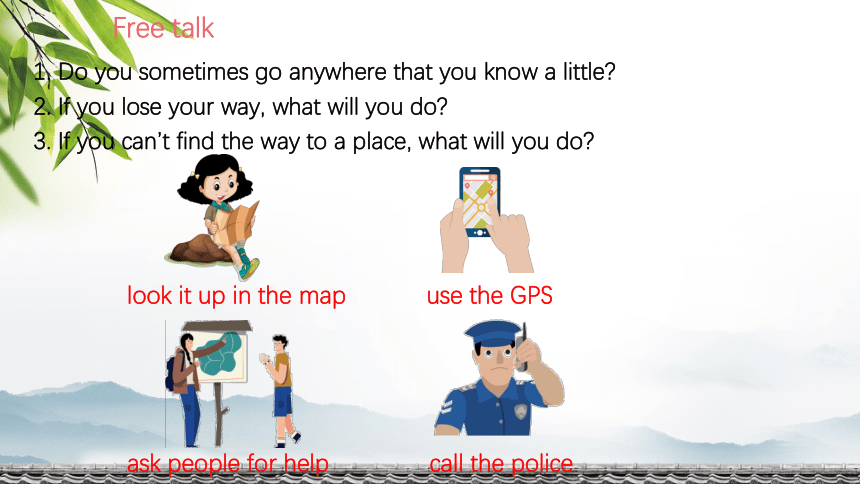
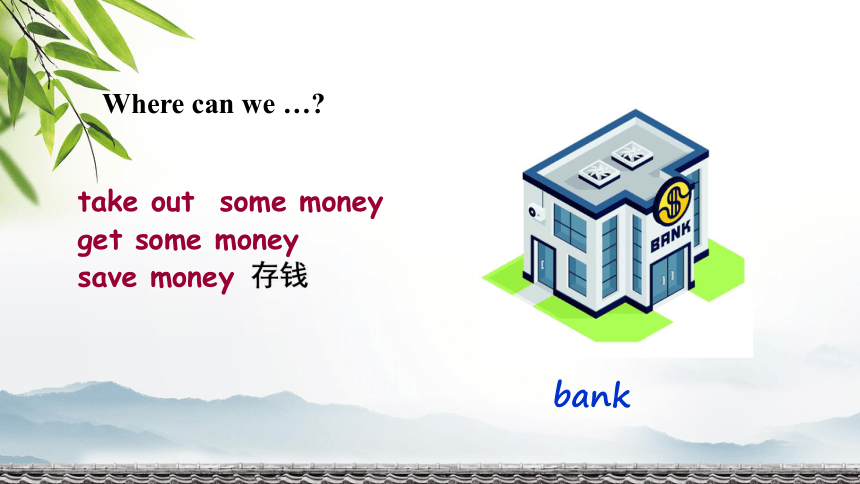
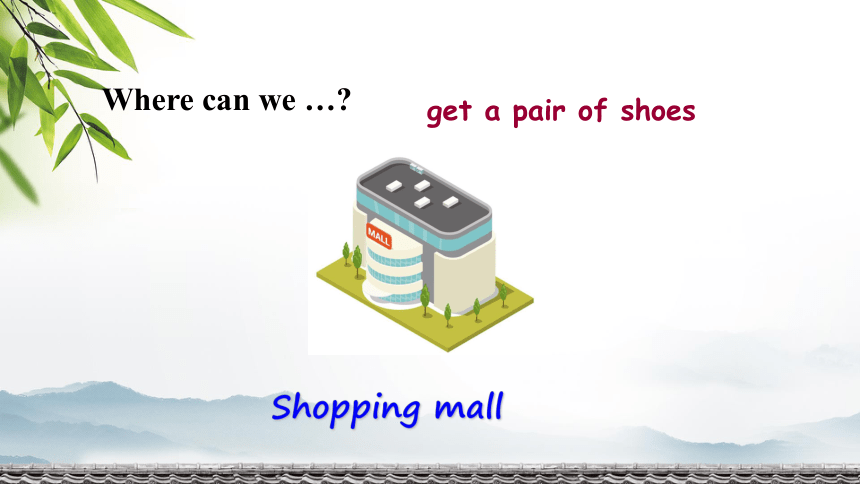
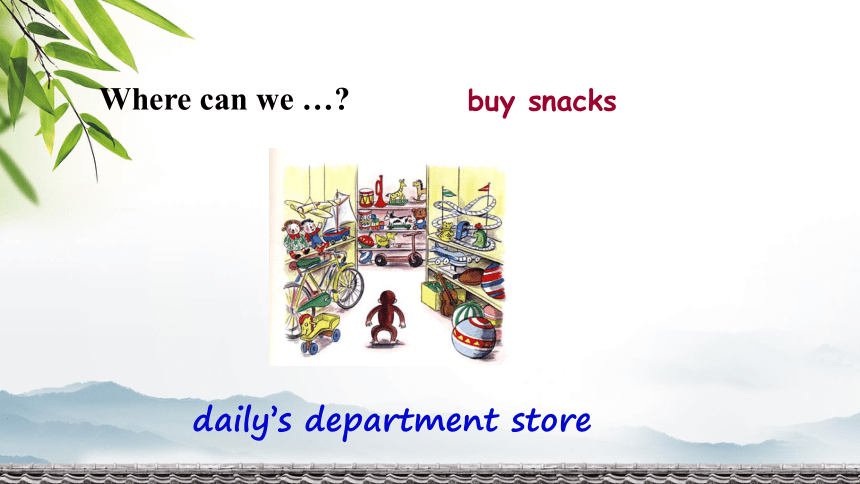
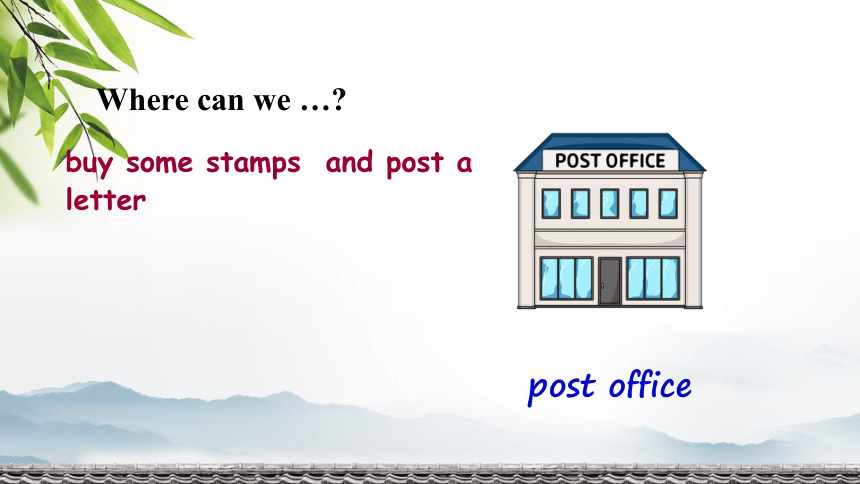

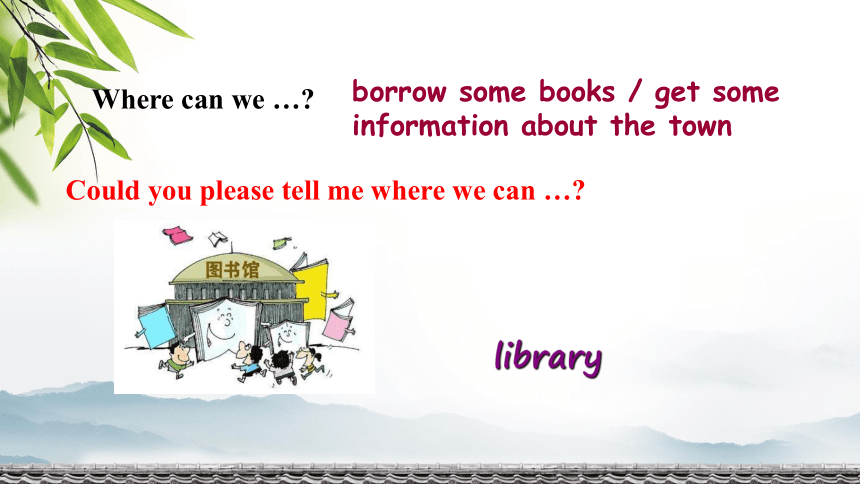

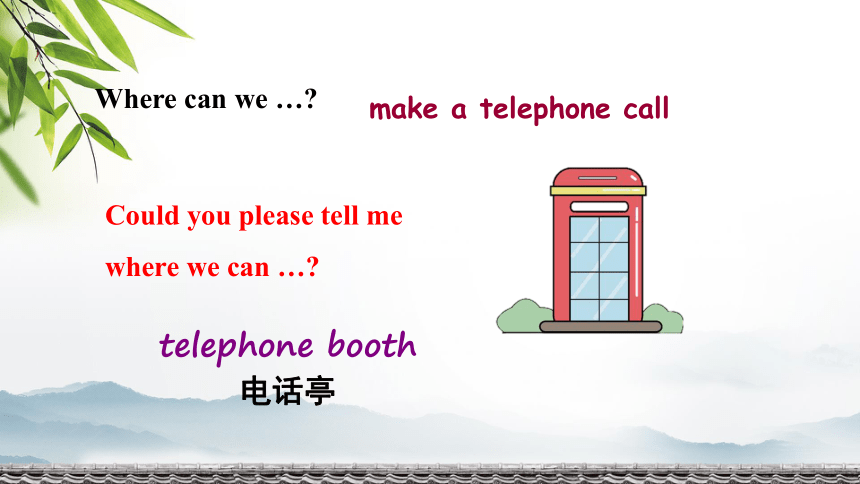
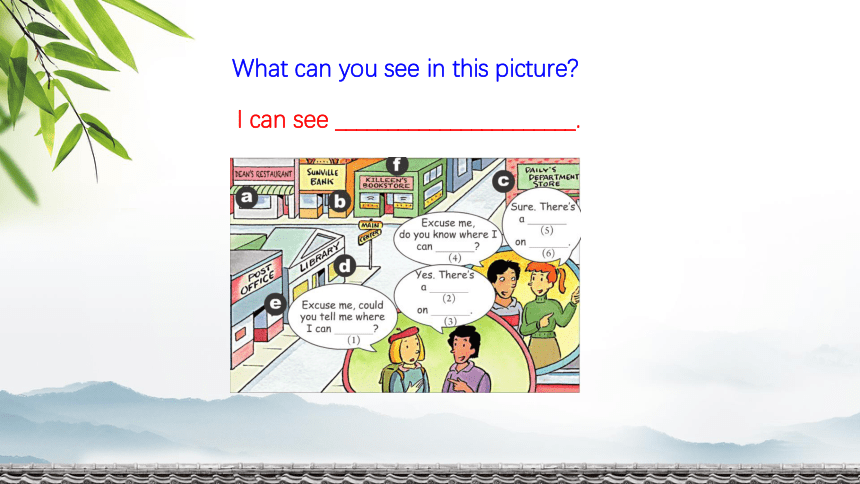

文档简介
(共32张PPT)
Unit 3 Could you please tell me where the restrooms are
Section A 1a-2d
Free talk
1. Do you sometimes go anywhere that you know a little
2. If you lose your way, what will you do
3. If you can’t find the way to a place, what will you do
look it up in the map
use the GPS
ask people for help
call the police
take out some money
get some money
save money
存钱
Where can we …
bank
get a pair of shoes
Where can we …
Shopping mall
daily’s department store
Where can we …
buy snacks
buy some stamps and post a letter
Where can we …
post office
rest and drink coffee
/have dinner
Where can we …
Could you please tell me where we can …
restaurant
library
borrow some books / get some information about the town
Where can we …
Could you please tell me where we can …
get some magazines
Where can we …
Could you please tell me
where we can …
book store
make a telephone call
Where can we …
Could you please tell me
where we can …
telephone booth
电话亭
What can you see in this picture
I can see _______________________.
___ get some money
___ get some magazines
___ have dinner
___ get a dictionary
___ get some information
about the town
___ buy a newspaper
___ buy some stamps
___ get a pair of shoes
b
c/f
a
f
d/f
f
e
c
Match each thing with a place in the picture. Many different answers are possible.
1a
1b
Listen and complete the conversations in the picture in 1a.
Girl: Excuse me, could you tell me where I can
________________
Boy: Yes. There’s a _________ on ______________.
Boy: Excuse me, do you know where I can
_______________
Girl: Sure. There’s a __________ on ___________.
buy some stamps
post office
Center Street
get a dictionary
Main Street
bookstore
陈述语序
get a pair of shoes
get some magazines
get a dictionary
get information about the town
Could you please tell me where I can ... Sure. There’s a ... on ... Street.
Practice
get some money
buy a
newspaper
buy some stamps
have
dinner
Could you please tell me where I can ...
Sure. There’s a ... on ... Street.
Ask for information politely
Excuse me, can you tell me…
Excuse me, do you know…
Could you please tell me where…
Could you please tell me how/ where I can…
Expressions about giving directions
Turn left/ right… at the… turning/ crossing.
… on one’s left/right.
Just go along… until…
Go to the… floor…
It’s between… and…/ near…/beside…/next to…
1c
Make conversations using the information in 1a. Then talk about your own town/city.
A: Excuse me, could you please tell me how to get to the bookstore
B: Sure, just go along Main Street until you pass Center Street. The bookstore is on your right, beside the bank.
A: Thanks. Do you know when the bookstore closes today
B: It closes at 7:00 p.m. today.
Make conversations.
Turn left.
Turn right.
Go / Walk along … until …
Go past …
What do they mean
A
next to …
on the right
A
B
between … and …
2a
Listen. You will hear some of the directions below. Number the directions in the order you hear them.
____ Go to the third floor.
____Turn left.
____ Go to the second floor.
____ Turn right.
____ The supermarket is between the flower store and
the bookstore.
____ Go past the bookstore.
2
1
4
3
2b
Listen again. Draw a line in the picture above to show how the boy walks to the supermarket.
2c
Make conversations about the other places in the picture in 2a.
A: Excuse me, do you know where I can get some postcards
B: Sure. Go to the second floor. There’s a bookstore between the bank and the supermarket.
Make a conversation with your partner.
Pair work
A: Excuse me. Can you tell me where I can buy some stamps
B: Yes, there’s a post office in this shopping center.
A: Do you know how to go there
B: Yes. Go to the third floor and turn right. Then go past the bank.
The post office is between museum and library.
A: Ok, great. Oh, and one more thing. Do you know …
B: I’m not sure, but you …
A: Ok, thanks a lot.
B: You’re welcome.
He Wei: This is Fun Times Park, the biggest amusement
park in our city!
Alice: I’m excited to try the rides!
He Wei: What should we start with There’s Space World,
Water World, Animal World…
Alice: Before we decide, could you first tell me where the
restrooms are
He Wei: Pardon Restroom You want to rest But we
haven’t even started yet!
be excited to do sth.
对做……感到兴奋
Role-play the conversation.
2d
Alice: Oh no, I don’t mean that. I mean… you know,
a washroom or bathroom.
He Wei: Hmm…so you mean…the toilet
Alice: Yes! Sorry, maybe people in China don’t often use
the word “restroom” when they speak English.
He Wei: That’s right. In China, we normally say “toilet” or
“washroom” in English. Anyway, they’re over there.
Alice: OK. I’ll be quick!
He Wei: No problem. You don’t need to rush!
意思是;意指
通常;正常情况下
仓促;急促
Fun Times Park is the ________ amusement park in the city. There is Space World, Water World, Animal World ... Alice and He Wei were so excited to try the ______ that they didn’t know which one to _____ ____. Before they decided, Alice wanted to go to the restroom. But He Wei ______________ her. Alice explained it ___ him. She said “restroom” means “ a __________ or bathroom”, not “a room for _______”. Because people in China don’t often use the word “restroom” when they speak English. ________, they ________ say “toilet or washroom” in English.
start with
misunderstood
washroom
resting
Instead
biggest
to
rides
normally
Fill in the blanks according to the conversation.
2) restroom, washroom, bathroom & toilet
以上词都可以表示“洗手间”。
中西方文化差异,习惯用语不同。
1. Before we decide, could you first tell me
where the restrooms are
1)该句是由连接副词where引导的宾语从句。
Language Points
2. I don’t mean that. I mean ...
mean v. “意思是…”
mean doing sth. “意味着”
Success means working hard.
成功意味着工作努力。
mean to do sth. “打算或企图做某事”, 其主语通常是表示人的名词或代词。
We mean to call on you tomorrow.
我们打算明天看望你。
3. You don't need to rush!你不必着急!
1)need在这里作行为动词,意为“需要”。作行为动词时,need有人称和数的变化,后面可接名词、代词、动名词及带to的动词不定式,可用于肯定句、疑问句或否定句中。
e.g. I don’t need to see the doctor.
She needs help.
need还可作情态动词,这时无人称和数的变化,后接动词原形,多用于否定句或疑问句中。
e.g. You needn’t worry.
2)rush用作动词,意为“仓促,急促”,常用短语:rush to do sth.意为“赶紧做某事,抢着做某事”。
e.g. She’s always rushing to finish first.
拓展
rush用作名词,意为“匆忙,高峰”,常用短语:
in a rush匆忙地,仓促地
rush hour(交通)高峰期,拥堵时刻
1. Can you tell me the way to …
2. Can you tell me which is the way to …
How do
we ask
the way
3. Do you know how to get to …
4. Do you know how I can get to …
5. Do you know if there is a /an …near here
6. Do you know where the (nearest) …is
7. Do you know where I can get to…
Summary1
How do
we show
the way
to others
1. Turn left /right at the first crossing.
3. Walk /Go along /down…Street until you pass…
4. It’s next to /across from /in front of /between…
and …
5. Go past…
2. Take the first turning on the right /left.
Summary2
Unit 3 Could you please tell me where the restrooms are
Section A 1a-2d
Free talk
1. Do you sometimes go anywhere that you know a little
2. If you lose your way, what will you do
3. If you can’t find the way to a place, what will you do
look it up in the map
use the GPS
ask people for help
call the police
take out some money
get some money
save money
存钱
Where can we …
bank
get a pair of shoes
Where can we …
Shopping mall
daily’s department store
Where can we …
buy snacks
buy some stamps and post a letter
Where can we …
post office
rest and drink coffee
/have dinner
Where can we …
Could you please tell me where we can …
restaurant
library
borrow some books / get some information about the town
Where can we …
Could you please tell me where we can …
get some magazines
Where can we …
Could you please tell me
where we can …
book store
make a telephone call
Where can we …
Could you please tell me
where we can …
telephone booth
电话亭
What can you see in this picture
I can see _______________________.
___ get some money
___ get some magazines
___ have dinner
___ get a dictionary
___ get some information
about the town
___ buy a newspaper
___ buy some stamps
___ get a pair of shoes
b
c/f
a
f
d/f
f
e
c
Match each thing with a place in the picture. Many different answers are possible.
1a
1b
Listen and complete the conversations in the picture in 1a.
Girl: Excuse me, could you tell me where I can
________________
Boy: Yes. There’s a _________ on ______________.
Boy: Excuse me, do you know where I can
_______________
Girl: Sure. There’s a __________ on ___________.
buy some stamps
post office
Center Street
get a dictionary
Main Street
bookstore
陈述语序
get a pair of shoes
get some magazines
get a dictionary
get information about the town
Could you please tell me where I can ... Sure. There’s a ... on ... Street.
Practice
get some money
buy a
newspaper
buy some stamps
have
dinner
Could you please tell me where I can ...
Sure. There’s a ... on ... Street.
Ask for information politely
Excuse me, can you tell me…
Excuse me, do you know…
Could you please tell me where…
Could you please tell me how/ where I can…
Expressions about giving directions
Turn left/ right… at the… turning/ crossing.
… on one’s left/right.
Just go along… until…
Go to the… floor…
It’s between… and…/ near…/beside…/next to…
1c
Make conversations using the information in 1a. Then talk about your own town/city.
A: Excuse me, could you please tell me how to get to the bookstore
B: Sure, just go along Main Street until you pass Center Street. The bookstore is on your right, beside the bank.
A: Thanks. Do you know when the bookstore closes today
B: It closes at 7:00 p.m. today.
Make conversations.
Turn left.
Turn right.
Go / Walk along … until …
Go past …
What do they mean
A
next to …
on the right
A
B
between … and …
2a
Listen. You will hear some of the directions below. Number the directions in the order you hear them.
____ Go to the third floor.
____Turn left.
____ Go to the second floor.
____ Turn right.
____ The supermarket is between the flower store and
the bookstore.
____ Go past the bookstore.
2
1
4
3
2b
Listen again. Draw a line in the picture above to show how the boy walks to the supermarket.
2c
Make conversations about the other places in the picture in 2a.
A: Excuse me, do you know where I can get some postcards
B: Sure. Go to the second floor. There’s a bookstore between the bank and the supermarket.
Make a conversation with your partner.
Pair work
A: Excuse me. Can you tell me where I can buy some stamps
B: Yes, there’s a post office in this shopping center.
A: Do you know how to go there
B: Yes. Go to the third floor and turn right. Then go past the bank.
The post office is between museum and library.
A: Ok, great. Oh, and one more thing. Do you know …
B: I’m not sure, but you …
A: Ok, thanks a lot.
B: You’re welcome.
He Wei: This is Fun Times Park, the biggest amusement
park in our city!
Alice: I’m excited to try the rides!
He Wei: What should we start with There’s Space World,
Water World, Animal World…
Alice: Before we decide, could you first tell me where the
restrooms are
He Wei: Pardon Restroom You want to rest But we
haven’t even started yet!
be excited to do sth.
对做……感到兴奋
Role-play the conversation.
2d
Alice: Oh no, I don’t mean that. I mean… you know,
a washroom or bathroom.
He Wei: Hmm…so you mean…the toilet
Alice: Yes! Sorry, maybe people in China don’t often use
the word “restroom” when they speak English.
He Wei: That’s right. In China, we normally say “toilet” or
“washroom” in English. Anyway, they’re over there.
Alice: OK. I’ll be quick!
He Wei: No problem. You don’t need to rush!
意思是;意指
通常;正常情况下
仓促;急促
Fun Times Park is the ________ amusement park in the city. There is Space World, Water World, Animal World ... Alice and He Wei were so excited to try the ______ that they didn’t know which one to _____ ____. Before they decided, Alice wanted to go to the restroom. But He Wei ______________ her. Alice explained it ___ him. She said “restroom” means “ a __________ or bathroom”, not “a room for _______”. Because people in China don’t often use the word “restroom” when they speak English. ________, they ________ say “toilet or washroom” in English.
start with
misunderstood
washroom
resting
Instead
biggest
to
rides
normally
Fill in the blanks according to the conversation.
2) restroom, washroom, bathroom & toilet
以上词都可以表示“洗手间”。
中西方文化差异,习惯用语不同。
1. Before we decide, could you first tell me
where the restrooms are
1)该句是由连接副词where引导的宾语从句。
Language Points
2. I don’t mean that. I mean ...
mean v. “意思是…”
mean doing sth. “意味着”
Success means working hard.
成功意味着工作努力。
mean to do sth. “打算或企图做某事”, 其主语通常是表示人的名词或代词。
We mean to call on you tomorrow.
我们打算明天看望你。
3. You don't need to rush!你不必着急!
1)need在这里作行为动词,意为“需要”。作行为动词时,need有人称和数的变化,后面可接名词、代词、动名词及带to的动词不定式,可用于肯定句、疑问句或否定句中。
e.g. I don’t need to see the doctor.
She needs help.
need还可作情态动词,这时无人称和数的变化,后接动词原形,多用于否定句或疑问句中。
e.g. You needn’t worry.
2)rush用作动词,意为“仓促,急促”,常用短语:rush to do sth.意为“赶紧做某事,抢着做某事”。
e.g. She’s always rushing to finish first.
拓展
rush用作名词,意为“匆忙,高峰”,常用短语:
in a rush匆忙地,仓促地
rush hour(交通)高峰期,拥堵时刻
1. Can you tell me the way to …
2. Can you tell me which is the way to …
How do
we ask
the way
3. Do you know how to get to …
4. Do you know how I can get to …
5. Do you know if there is a /an …near here
6. Do you know where the (nearest) …is
7. Do you know where I can get to…
Summary1
How do
we show
the way
to others
1. Turn left /right at the first crossing.
3. Walk /Go along /down…Street until you pass…
4. It’s next to /across from /in front of /between…
and …
5. Go past…
2. Take the first turning on the right /left.
Summary2
同课章节目录
- Unit 1 How can we become good learners.
- Section A
- Section B
- Unit 2 I think that mooncakes are delicious!
- Section A
- Section B
- Unit 3 Could you please tell me where the restroom
- Section A
- Section B
- Unit 4 I used to be afraid of the dark.
- Section A
- Section B
- Unit 5 What are the shirts made of?
- Section A
- Section B
- Review of Units 1-5
- Unit 6 When was it invented?
- Section A
- Section B
- Unit 7 Teenagers should be allowed to choose their
- Section A
- Section B
- Unit 8 It must belong to Carla.
- Section A
- Section B
- Unit 9 I like music that I can dance to.
- Section A
- Section B
- Unit 10 You're supposed to shake hands.
- Section A
- Section B
- Review of Units 6-10
- Unit 11 Sad movies make me cry.
- Section A
- Section B
- Unit 12 Life is full of the unexpected
- Section A
- Section B
- Unit 13 We're trying to save the earth!
- Section A
- Section B
- Unit 14 I remember meeting all of you in Grade 7.
- Section A
- Section B
- Review of Units 11-14
